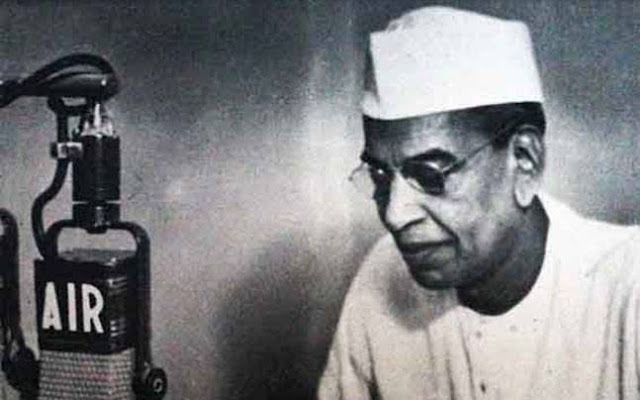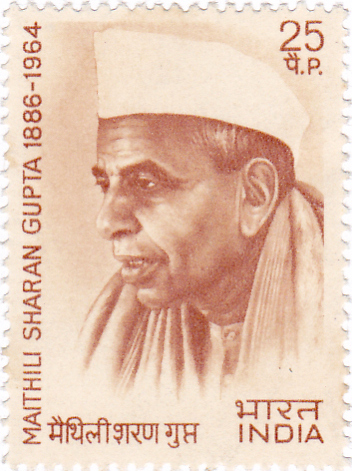Maithili Sharan Gupt
Swarnalata, Rasikendu, Dadda or Rashtrakavi. So many salutations to a writer who was a pioneer in Khari Boli (plain dialect) . These were the names that were used to address the great Hindi poet and novelist Maithili Sharan Gupt. Born on 3rd August 1886 in Chirgaon near Jhansi, Gupt and the written word couldn't be separated for long. Books and newspapers influenced him a lot and so in his childhood, he used to write chhappay (A simple verse poetry with six stanzas)

Under the name 'Swarnalata' (literal meaning lustrous). When that became popular locally he was guided by his teachers to write more. In his adolescence he started using the names 'Rasikesh' or 'Rasikendu' (literal meaning lord of the senses),etc. He diversified his writing into translation work under the name 'Madhup' (literal meaning Honeybee).
He got inclined towards poetry while reading 'Laghu Siddhant Kaumudi'. Also guided by a learned scholar Acharya Mahavir ji, his poetry got published in the then popular magazine ‘Saraswati’. Initially he composed poetry in Braj language and wrote many aphorisms in Sanskrit verses.
Agitated by the atrocities of the British government and heavily affected by the freedom struggle, Gupt wrote poems against the British under the names 'Bharatiya' (literal meaning Indian) and 'Nityanand' (literal meaning Perennially Happy ). The Indian literary world of the time used to call him 'Dadda'. (literal meaning - a learned elder person )

Gupt was one of the most important modern Hindi poets. He is considered one among the pioneers of Khari Boli (plain dialect) of literature of poetry and wrote in pure dialect as well. He distinguished himself as a writer of elitism in language rather than the commonly used language. Most Hindi poets favoured the use of Braj Bhasha dialect. He was a recipient of the third highest (then second highest) Indian civilian honour of Padma Bhushan. For his book Bharat-Bharati (1912),widely quoted during India's freedom struggle, he was given the title of Rashtra Kavi by Mahatma Gandhi. He passed away on 12 December 1964.
He was awarded Mangala Prasad Award for 'Saket'. The President had nominated him as a member of the Rajya Sabha. The Government of India decorated him with 'Padma Bhushan'. His birth anniversary on 3 August is celebrated as 'Poet's Day' in India every year.
Maithili Sharan Gupt's contribution to Hindi Literature
Two epic poems - Bharat-Bharati (1912) and Saket (1931)
Other Poetry - Khandakavya: Rang Mein Bhang (1909), Jayadratha-Vadh (1910), Shakuntala (1914), Panchavati (1915), Kisan (1916), Sairandhri (1927), Vaksanhar (1927) ), Van Vaibhav (1927), Shakti (1927), Yashodhara (1932), Dwapar (1936), Siddharaj (1936), Nahusha (1940), Kunal Geet (1941), Karbala (1942), Ajit (1946), Hidimba (1950), Vishnupriya (1957), Ratnavali (1960), Urmila (unpublished, 1908-09)
Story-based essay poetry: Patravali (1916), Vikat-Bhat (1928), Gurukul (1928), Arjan and Visarjan (1942), Kaaba (1942), Pradakshina (1950), Yudh (1950), Kavi Shri (1955), Nal Damayanti (unpublished, 1910-11)
Essay-poetry: Bharat-Bharati (1912), Hindu (1927), Raja-Praja ( 1956
About the poem Manushyta
The poem Manushyta is essentially a poem which calls out and inspires humans to live selflfessly and to understand the true purpose of life - which is sacrifice for the fellow being.
Maithili Sharan Gupt brings in many elements of the world and compares them to humans. He does this to ultimately say that there is only one duty of man and that is to die for a fellow man.
The poem is available in the orginal language at
https://www.hindikavykosh.in/2022/02/maithlisharan-gupt-kavita-manushyata.html
English literal verse by verse translation of the poem -
Die, but die in such a way that everyone remembers.
If it is not a good death, then die in vain, live in vain.
Not the one who didn't live for you.
This is the animal instinct to graze on your own.
He is the man who died for man
Saraswati Bakhanavi is the story of the same generous person.
The earth feels grateful for that generosity.
The living fame of that generous person always shines;
And the entire creation worships that generous person.
The unbroken soul that fills the infinite world.
He is the only man who dies for man.
Sympathy is needed, he is a great personality;
bewitchment is always made by itself.
Contradiction flowed in the flow of Buddha's mercy.
Should the polite people not bow before you?
Aha! Only he who does charity is generous.
There is a man who dies for man.
Infinite Gods are standing in infinite space.
The great ones who are raising their arms in front of us.
Everyone should rise and grow with mutual support.
Now all of you should get tainted in the immortality mark.
Live as if you are of no use to anyone else.
He is the only man who dies for man.
“Man is only a friend” This is great wisdom.
Old scriptures’ self-proclaimed father is a famous one.
There are definitely external differences in karma according to its results.
But in inner self there are authentic scriptures.
It is unfortunate that there are no brothers and the pain of the brother is not there.
He is the only man who dies for man.
Let's play happily in the desired path.
Pushing away whatever adversities befall them.
Yes, there should be no difference, no difference should ever increase.
Everyone should be a vigilant sect of the same sect.
Only then is there a strong feeling that one can shine.
He is the only man who dies for man.
Don't ever forget to be intoxicated with trivial finances.
Saints should make you proud.
God is here at the end
The kind poor brother has big hands.
Too unfortunate to be filled with dark feelings
He is the only man who dies for man.
Manushyta Summary
Maithili Sharan Gupt compares humans to other creatures in nature and says humans have greater power of thinking, understanding and analysing the sorrow of others. Man is not merely a physical animal . He further explains that the mundane activities of animals like daily grazing, aimless wandering in the fields is all just play in the eyes of a capable human. He rises above all this when he does his duty which is capable only of him.
When animals go to pasture, they graze only for themselves, but humans are not like that. Whatever he earns, whatever he creates, he does it for others and also with the help of others.
Gupt considers those who are concerned about the happiness and sorrow of their loved ones as humans but is not ready to accept that those humans have all the qualities of humanity. The poet considers only those people as great who worry about others before the happiness and sorrow of their own. He expects a human to have those qualities by which the man remains in the memories of others for centuries even after leaving this mortal world, that is, he remains immortal even after death.
Manushyta Stanza explanation
Stanza explanation
In this poem the poet is trying to explain the true meaning of humanity.
In the first stanza, the poet says that we should not be afraid of death because death is certain but we should do something so that people remember us even after death. A real man is one who learns to live and die for a fellow human.
In the second stanza the poet says that we should become generous and giving.
In the third stanza, the poet says that there are many examples in the Puranas (scriptures / holy books) of those people who are still remembered for their sacrifice. A true man is one who knows the value of sacrifice.
In the fourth stanza, the poet says that there should be a feeling of kindness and compassion in the minds of human beings, the one who lives and dies for others is called a human being.
In the fifth stanza the poet wants to say that there is no orphan here because we are all children of that one all-knowing God. We should think about discrimination.
In the sixth stanza, the poet wants to say that we should be kind because even God welcomes all kinds of nature in humans - bad or good.. Therefore, we should do charity and welfare for others.
In the seventh stanza, the poet says that the external actions of human beings may be different, but the holy books testify that everyone's soul is one, we are all children of the same God, hence all human beings are brothers. And man is the one who helps other humans in their sorrow.
In the last stanza, the poet wants to say that man should walk on his chosen path while removing the calamities and obstacles, should maintain mutual understanding and should not increase discrimination. Only a person with such thinking can bring welfare and salvation to himself and others.
In the first stanza, the poet says that we should not be afraid of death because death is certain but we should do something so that people remember us even after death. A real man is one who learns to live and die for a fellow human.
In the second stanza the poet says that we should become generous and giving.
In the third stanza, the poet says that there are many examples in the Puranas (scriptures / holy books) of those people who are still remembered for their sacrifice. A true man is one who knows the value of sacrifice.
In the fourth stanza, the poet says that there should be a feeling of kindness and compassion in the minds of human beings, the one who lives and dies for others is called a human being.
In the fifth stanza the poet wants to say that there is no orphan here because we are all children of that one all-knowing God. We should think about discrimination.
In the sixth stanza, the poet wants to say that we should be kind because even God welcomes all kinds of nature in humans - bad or good.. Therefore, we should do charity and welfare for others.
In the seventh stanza, the poet says that the external actions of human beings may be different, but the holy books testify that everyone's soul is one, we are all children of the same God, hence all human beings are brothers. And man is the one who helps other humans in their sorrow.
In the last stanza, the poet wants to say that man should walk on his chosen path while removing the calamities and obstacles, should maintain mutual understanding and should not increase discrimination. Only a person with such thinking can bring welfare and salvation to himself and others.



No comments:
Post a Comment